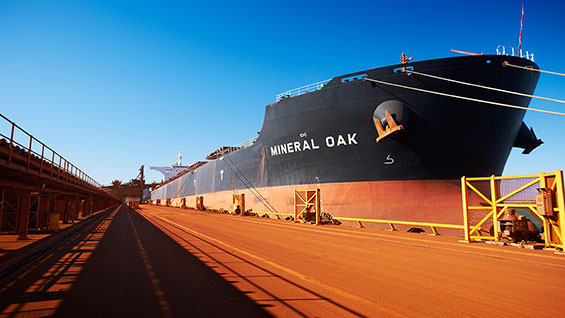China port bans Australian coal imports
Customs at China's northern Dalian port has reportedly banned imports of Australian coal and will cap overall coal imports for 2019 through its harbours at 12 million tonnes.
Customs at China's northern Dalian port has banned imports of Australian coal and will cap overall coal imports for 2019 through its harbours at 12 million tonnes, an official at Dalian Port Group has told Reuters.
The indefinite ban on imports from top supplier Australia, effective since the start of February, comes as major ports elsewhere in China prolong clearing times for Australian coal to at least 40 days.
However, the local currency spiked on Friday morning after Treasurer Josh Frydenberg told ABC radio there was no Chinese ban on Australian coal.
Coal is Australia's biggest export earner and the Australian dollar tumbled on the news, falling more than 1 per cent to as low at $0.7086.

Beijing has been trying to restrict imports of coal more generally to support domestic prices
Five harbours overseen by Dalian customs - Dalian, Bayuquan, Panjin, Dandong and Beiliang - will not allow Australian coal to clear through customs, said the official. Coal imports fromRussia and Indonesia will not be affected.
The ports handled about 14 million tonnes of coal last year, half of which was from Australia, said Gu Meng, analyst at Orient Futures.
The Dalian official declined to be named due to the sensitivity of the matter. Neither Dalian customs nor the General Administration of Customs immediately responded to a request for comment.
The source said he was not given a reason for the ban on Australian imports.
"I'm aware of unconfirmed and unsourced media reports and have asked our ambassador in Beijing to urgently clarify their veracity," Australian Trade Minister Simon Birmingham said in a statement.
"We continue to engage closely with industry on matters of market access.
"I met with the Minerals Council of Australia this week to discuss market access issues and our related representations to Chinese authorities."
Senator Birmingham said he trusts the free trade agreement commitments between the two countries will continue to be honoured.
The ban comes amid simmering tensions between Beijing and Canberra over issues such as cyber security, the ban of Chinese tech company Huawei over 5G and China's influence in Pacific island nations. Australia recently revoked the visa of a prominent Chinese businessman, further straining ties.
Asked if the ban was related to bilateral tensions, Geng Shuang, a spokesman at China's foreign ministry, told reporters that customs were inspecting and testing coal imports for safety and quality.
"The goals are to better safeguard the legal rights and interests of Chinese importers and to protect the environment," he said, adding that the move was "completely normal".
Beijing has been trying to restrict imports of coal more generally to support domestic prices.
Spot Australian coking coal at northern Chinese port Jingtang is 200 yuan ($42) cheaper per tonne than domestic prices, according to data tracked by Orient Futures. Prices of thermal coal are approximately the same.
Dalian handles both thermal and coking coal imports but the clampdown is expected to have a bigger impact on coking coal, used in steel making, than thermal coal, used to generate electricity.
"It is hard to find a replacement for Australian coking coal since its sulphur content is very low," said a purchasing manager at a large coke plant in Hebei province.
"Current inventory at ports should be sufficient to support usage for one or two months, but it could be a problem in the long term, especially if other ports also tighten imports," he added.
He declined to be named due to company policy.
The most-active coking coal contract for May delivery rose more than 2 per cent during morning trade on Thursday.
"(The restriction) will further squeeze profit margins at steel mills after Vale's accident has already driven up iron ore prices," said Gu at Orient Futures.


